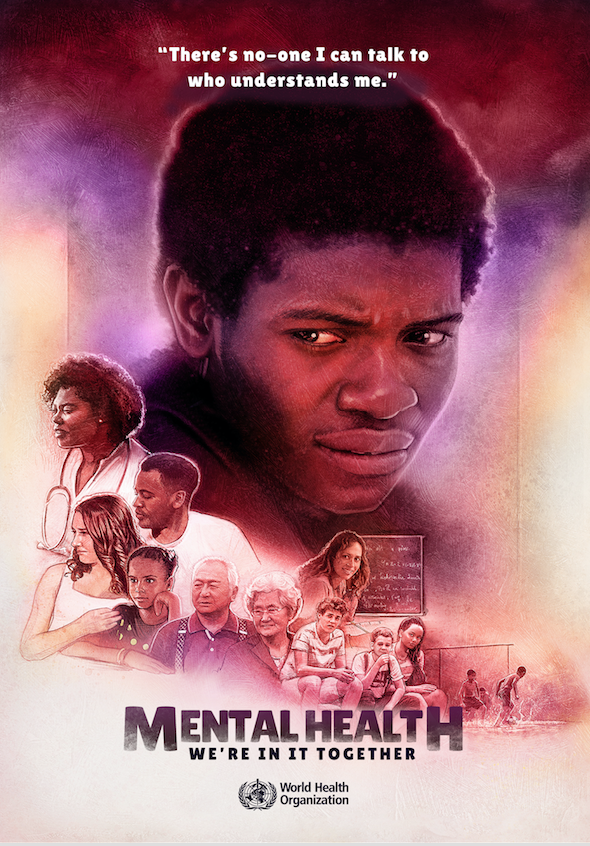Health: World Mental Health Day
(Photo Credits: Screengrab from WHO)
Today—October 10, 2018—marks the 26th World Mental Health Day. This day is observed every year to promote global mental health education, raise awareness on mental health issues, and to curb and hopefully end the stigma surrounding mental illness.
This year’s theme, “Young People and Mental Health in a Changing World,” was chosen to underscore the plight of the youth. Because in this day and age, it is said that suicide has become the “second leading cause of death among 15-29-year-olds” globally and that “half of all mental illness begins by the age of 14.” According to the World Health Organization (WHO), no one is more vulnerable to “mental distress and illness” more than the youth. WHO explained this is because it is during adolescence and the early years of adulthood that many changes in life occur. The organization cited the following as examples: “changing schools, leaving home, and starting university or a new job.” These, on top of the pressures that they face in this internet age where online connectivity could render our youth vulnerable to cybercrimes and cyber bullying.
On the other hand, the LGBTQ youth in this stage of their life are “feeling alone and persecuted for being true to themselves while young adults are at the age when serious mental illnesses can occur,” according to the World Federation for Mental Health. This is why it is imperative that they be taught about mental illness and wellbeing this early in life so that they may be able to cope with life’s challenges and build mental resilience. And this is where we, adults, come in: by making sure they have the skills and support they need in life and also, by educating them about mental health.
But why is it important to help our youth build mental resilience? It’s because poor mental health has long-term consequences, one that they may carry well into their adult life thereby damaging it if left unaddressed.
As for us, adults, the University of Michigan has these tips on how to keep our balance or how to rebalance ourselves.
Let today serve as a reminder to be kind to yourself & compassionate to others. We are all battling our own demons. Depression & anxiety are nothing to be ashamed of! Ask for help if you’re struggling – it doesn’t make you weak it actually makes you STRONG! #WorldMentalHealthDay
— Gus Kenworthy (@guskenworthy) October 10, 2018
Feeling blue. Read more: https://t.co/S9YIoiIH3L #worldmentalhealthday pic.twitter.com/r6kG79EPbj
— World Economic Forum (@wef) October 10, 2018
It’s okay not to be okay.
However, reaching out and talking can be that important first step.
Don’t suffer in silence. #WorldMentalHealthDay pic.twitter.com/ziHf0dvmJn
— Scottish Fire and Rescue Service (@fire_scot) October 10, 2018
Some days you feel fine, some days you feel like you can’t move
Some days you feel yourself and some days you feel lostYour mental health doesn’t define you as a person & it’s okay to reach out for help. Be there for people when they need you most.#WorldMentalHealthDay
— Jack Mull (@J4CKMULL) October 10, 2018
By talking openly & honestly about our mental health challenges, we can break down stigma, help others feel supported, and build a healthier, more compassionate society for everyone. #WorldMentalHealthDay https://t.co/Fd97lqniso
— Justin Trudeau (@JustinTrudeau) October 10, 2018
If you, or anyone you know is in crisis, call the National Suicide Prevention Lifeline at 1-800-273-TALK (8255) or contact the Crisis Text Line by texting TALK to 741741. You may also click here for options. On the other hand, Adam4Adam members and readers who reside outside of United States may check the numbers below. For more information and resources, click here.
International Suicide Hotlines:
Source: FMH
Argentina: +5402234930430
Australia: 131114
Austria: 017133374
Belgium: 106
Bosnia & Herzegovina: 080 05 03 05
Botswana: 3911270
Brazil: 212339191
Canada: 5147234000 (Montreal);
18662773553 (outside Montreal)
Croatia: 014833888
Denmark: +4570201201
Egypt: 7621602
Estonia: 3726558088;
in Russian 3726555688
Finland: 010 195 202
France: 0145394000
Germany: 08001810771
Holland: 09000767
Hong Kong: +852 2382 0000
Hungary: 116123
India: 8888817666
Ireland: +4408457909090
Italy: 800860022
Japan: +810352869090
Mexico: 5255102550
New Zealand: 045861048
Norway: +4781533300
Philippines: 028969191
Poland: 5270000
Portugal: 21 854 07 40/8 . 96 898 21 50
Russia: 0078202577577
Spain: 914590050
South Africa: 0514445691
Sweden: 46317112400
Switzerland: 143
United Kingdom: 08457909090
USA: 18002738255
Veterans’ Crisis Line: 1 800 273 8255/ text 838255




I’m really glad there are a lot more people who finally understand the struggles of Mental Health patients. I’ve been suffering with Bipolar Disorder for years and my parents kept on insisting that I was just very moody and fickle minded, that I need to fix myself. Back in their day medication wasn’t really an option.